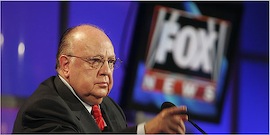A commentary on Fox News Channel's history of not commenting
06/12/08 02:33 PM


By ED BARK
"Don't ask, don't tell" has another high-profile practitioner -- Fox News Channel.
This odd bit of business by a worldwide media company was reinforced anew in a Thursday (June 12th) New York Times article headlined "Networks Firm Up Convention Lineups."
Reporter Jacques Steinberg, well-experienced in news media coverage, offered a nuts-and-bolts roundup of how much time ABC, NBC, CBS, CNN and MSNBC tentatively plan to devote to this summer's national political conventions. Representatives of those five networks talked to him. Fox News Channel didn't, prompting Steinberg to write, "A Fox News spokeswoman, Dana Klinghoffer, refused to discuss the channel's plans."
Does that make any sense, particularly in times when your ratings aren't quite so all-powerful anymore? Wouldn't you want to be included in a prominently played story that basically sought only basic information?
OK, maybe you're thinking that FNC views the Times as a liberal enemy of all it stands for. So why would they cooperate?
But FNC pretty much behaves this way with media reporters in general. The network likes to pitch its own story ideas, and often isn't at all shy about telling recipients where and when those stories should run. But FNC historically clams up when reporters initiate contact. It simply doesn't play well with others, which makes it all the easier for spurned reporters to lob a few grenades.
Steinberg, for instance, could have used the less incriminating "declined" rather than "refused." But why be nice to a newsgathering network that doesn't want news gathered about it?
It should be noted that Klinghoffer is one of FNC's more approachable publicists, even though she regularly has her guard up. But her marching orders are from on high, whether she particularly likes them or not.
FNC star personality, Bill O'Reilly, of course gets all outraged when his subjects of interest choose to bypass "The Factor." What are they afraid of? How dare they? Etc., etc.
This isn't a particularly good time for O'Reilly's network to play hard to get, though. The latest national weekly cable ratings (June 2-8) from Nielsen Media Research aren't particularly great news for the long-dominant lord of the cable news universe.
FNC averaged 1.703 million viewers in prime-time for that eventful political week, with CNN close behind at 1.418 million and long-downtrodden MSNBC making a little noise with an average of 1.016 million.
For the total programming day last week, FNC drew an average of 940,000 viewers, with CNN at 747,000 and MSNBC falling out of the weekly top 20.
In both instances, FNC's numbers are up from a comparable week one year ago (June 4-10, 2007), when it averaged 1.564 million viewers in prime-time and 897,000 for the total programming day.
Its competitive edge over CNN has shrunk, though. A year ago, CNN failed to even make the top 20 of either cable list, which respectively bottomed out with ESPN (1.001 million viewers) and Comedy Central (604,000 viewers). This time around, CNN ranked 8th and 11th, with presidential politics no doubt helping the ratings of all three all-news networks.
Also of interest: the top 40 cable programs for last week.
CNN had the No. 3 attraction with June 3rd's election night edition of Anderson Cooper 360 (4.523 million viewers). It also had the No. 16-ranked Election Center (3.788 million viewers).
FNC had no program in cable's latest weekly top 40. Nor did MSNBC.
There may come a time, in the not so distant future, when FNC will want and even need media coverage. Human nature being what it is, some reporters may in turn be less than receptive.
